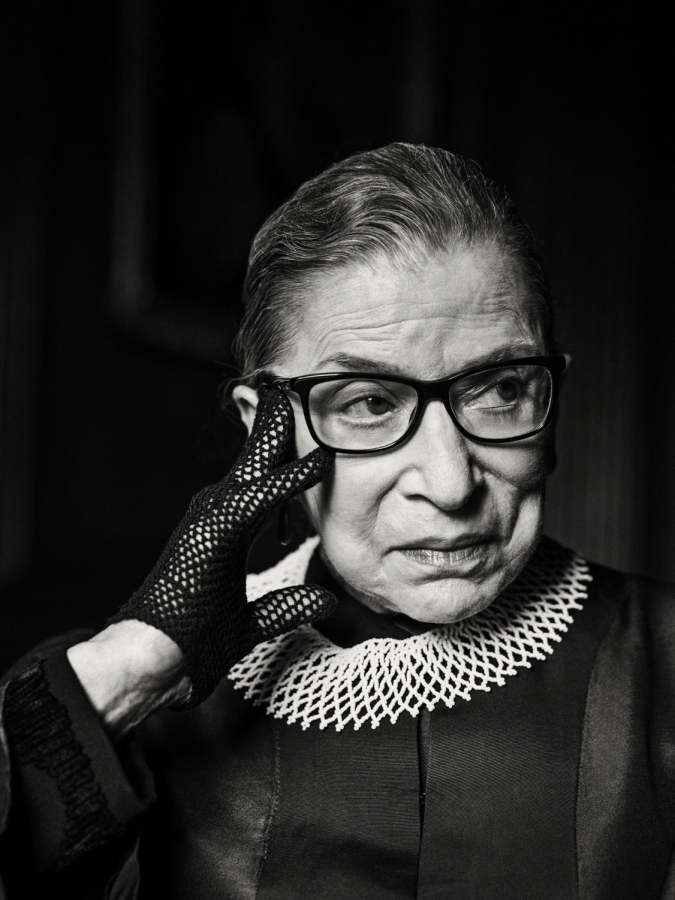The Legacy of Ruth Bader Ginsburg.
“The Notorious R.B.G”
Ruth Bader Ginsberg posing for the camera in her signature Supreme Court collar.
October 3, 2020
Ruth Bader Ginsburg was born in 1933 in Brooklyn, New York City. She had a long career in law starting off with a vast amount of higher education. She earned her bachelor’s degree at Cornell University and continued with her law school at Harvard University. From there she transferred to Columbia Law School, graduating joint first in her class. From there she began what would be known as a revolutionary career.
Ginsburg’s long career started with significant participation in different law-related jobs. As a minority in the field of law, she started as a professor at several universities. After those years, Ginsburg spent her legal career advocating for gender equality and women’s rights. She directed the influential Women’s Rights Project of the American Civil Liberties Union during the 1970s. In this position, she led the fight against gender discrimination and successfully argued six landmark cases before the U.S. Supreme Court. Before being appointed to the Supreme Court she advocated as a volunteer attorney for the American Civil Liberties Union and was a member of its board of directors. President Jimmy Carter appointed her to the U.S. Court of Appeals for the District of Columbia in 1980, where she served until 1993.
In 1993, Ginsburg was nominated by Bill Clinton as an associate justice of the Supreme Court of the United States. At the time, she was viewed as a moderate and progressed left over time. As the first Jewish woman and second woman to ever serve on the Court, her nomination was monumental.
Ginsburg, once serving on the Court, became iconic and revolutionary for women’s rights. During her time on the Court, one of the most famous writings she partook in was the United States v. Virginia. This case held the Virginia Military Institute accountable for not giving admission to qualified women. This case was a monumental part of women’s rights because it showed that women are as equally qualified as men are and that women can not be silenced. Another time that Ginsburg fought discrimination against women is the case Ledbetter v. Goodyear Tire & Rubber Co. In this case, a female worker was being paid significantly less than her male co-workers with the same qualifications. She spoke out against the wage inequality that continues in the U.S. and moved to pass legislation to prevent this. In 2009, after the election of President Obama, Ginsburg worked with him to pass his very first piece of legislature, the Lilly Ledbetter Fair Pay Act of 2009. This act prohibits wage discrimination between men and women in the same establishment who performs jobs that require substantially equal skill, effort, and responsibility. This was another monumental part of gender equality because it moved to close the wage gap between women and men.
Besides her career, Ginsburg was also a woman of family. She married Martin D. Ginsburg after she graduated from Cornell. They had a daughter, Jane C. Ginsburg who became a professor at Columbia Law School. Their son, James Steven Ginsburg followed up a career in music, founding Cedille Records. Ginsburg found much joy in her family and is well known to love them very much.
Unfortunately, Ginsburg fell extremely ill while still on the Court. She was diagnosed with pancreatic cancer and battled with it for a long time. She passed away due to complications of cancer on the evening of Rosh Hashanah. This was significant to her, as well as the Jewish community as stated Rabbi Richard Jacobs. He said that “One of the themes of Rosh Hashanah suggests that very righteous people would die at the end of the year because they were needed until the very end.” (Oyez.com). After the announcement of her death on September 18, 2020, thousands gathered in front of the Supreme Court with flowers, candles, and other gifts to honor her death.
Her death leaves a controversial vacancy on the Supreme Court almost six weeks before the 2020 presidential election. Danielle Huizar (10) says, “Her death is such a turning point for politics.” Ginsburg proved that she was a force to be reckoned with and flourished in the face of adversity. Her legacy on the Court was a legacy of fighting for gender equality and giving her judicial duties to the Supreme Court, where she was, among the most avid questioners and servers on the bench. With that, the United States of America can only hope for someone to live up to the legacy of Ruth Bader Ginsburg.






















Anita Tun • Dec 10, 2020 at 8:40 AM
RBG has left a remarkable legacy, loved the article!
Sarah Lemos • Oct 9, 2020 at 10:17 AM
You wrote her story beautifully! Love your words. It’s important to keep her story going.